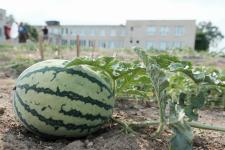Field News: First Successes at School experimental sites

In School gardens, participating in the “Watermelon and His Friends” Initiative, experimental work is in full swing. Teachers say that children take care of plants, planted on school beds, with pleasure: water them, weed, loosen the earth around them, observe how the plants bloom, how the fruits tie and grow - in other words, the children learn useful labor skills, study agricultural technology of cultivation of this southern culture and comprehend the basics of experimental work.
Of course, there were some difficulties. Many teams had difficulties after planting seedlings in the ground: for a long time they were lethargic and yellow, some of them even died. In one of the schools, the seedlings after planting suffered from heavy rain, in some gardens some of the formed fruits rotted. During the experiment, other questions arose: how to help plants during the adaptation period after planting, how to properly process and top dress, how to sprinkle lash nodes, when to pinch, whether extra ovaries should be cut off - the experts of the initiative consulted the participants on all these issues.
The efforts of the young experimenters and their teachers were rewarded, and now they can already boast of their first successes. Thanks to the attentive care, mass fruit production began at the experimental sites by mid-June. The hot weather in early summer contributed to the good development of plants, and even those of them, that were not going to grow, are now developing quite successfully.
At the end of June, a photographer of the project, Semyon Shevtsov, visited several teams of experimental melon growers. We invite you to see how things are going on the pilot sites of three schools - Malozhin and Ruchaevka schools (Gomel region), as well as the Khimovsky EPC (Mogilev region).
Watermelon and his friends from Malozhin school

The successes of the young "watermelon growers" from Ruchaevka

"Watermelon" experiment at the site of the Khimovsky EPC
This publication has been produced with the support of the European Union and the Green Cross International. Responsibility for the content of this publication lies with the public organization “Green Cross Belarus”, and it can in no way be taken to reflect the views of the European Union and Green Cross International.
